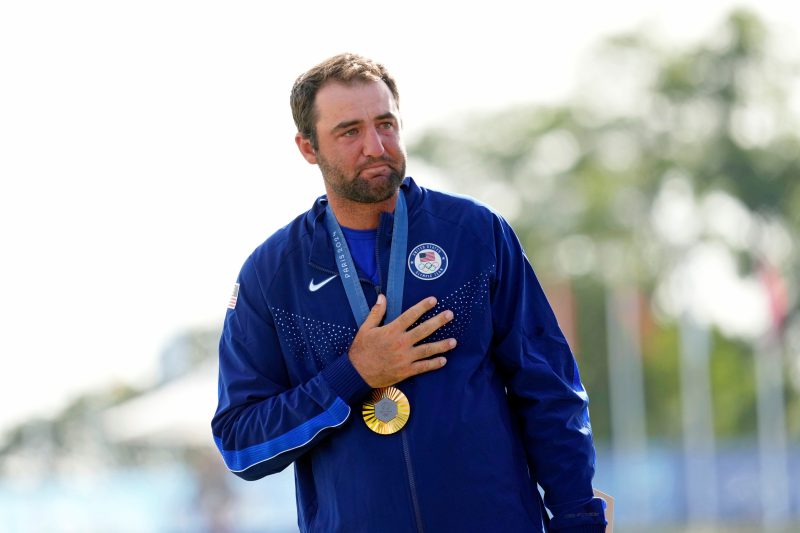SAINT-QUENTIN-EN-YVELINES, France — That stoic, subdued, unflappable Scottie Scheffler is more emotional than you’d think. Did you know he cried when he won the Masters, too?
Took a “bathroom break” in Augusta to get a moment alone, and “I cried pretty good,” he admitted.
He said he got emotional earlier this week, too, from the seats while watching the U.S. women’s gymnastics team receive their gold medals. So the significance of what Scheffler accomplished Sunday at Le Golf National has never been lost on him, before or after he had a gold medal around his neck. That reality was illustrated by the incomparable sight of the world’s No. 1 golfer shedding tears and wiping his face on the podium while wearing a gold medal and hearing “The Star-Spangled Banner” resonate around the 18th green.
‘I take tremendous pride in coming over here and representing my country,” Scheffler said. “… It was just very emotional being up on stage there as the flag was being raised, singing the national anthem.”
Not a golf moment, this one. It was an Olympic moment that happened to take place on a golf course.
2024 Olympic medals: Who is leading the medal count? Follow along as we track the medals for every sport.
This sport isn’t accustomed to those yet. We won’t consider Scheffler an Olympic hero in the United States, because we already know him as a top professional golfer.
What Scheffler did Sunday, however, was a heroically Olympian performance. For him to be standing atop that podium Sunday felt improbable all afternoon. He showed up four shots behind the leaders. He needed to start fast, and he did, with three birdies. Seemed like everyone atop the leaderboard, though, had it going on the front nine.
Then two things happened. Scheffler started playing a little better, and everyone else contending for a medal started playing a lot worse. Scheffler shot a 6-under-par 29 on the back nine, scoring birdies on four consecutive holes.
The USA TODAY app gets you to the heart of the news — fast.Download for award-winning coverage, crosswords, audio storytelling, the eNewspaper and more.
About five more things, however, had to happen in addition to Scheffler’s course-record 62 for him to snatch the gold medal at 19 under.
And they all did.
Spain’s Jon Rahm, who led by four shots at one point, made a mess of things, ending up 4 over on the back nine and out of the medals at 15 under. Ireland’s Rory McIlroy had to ease up and make a few key mistakes, and he did. Japan’s Hideki Matsuyama didn’t birdie any of the final six holes, keeping him at 17 under.
Scheffler’s American teammate Xander Schauffele, too, had to not do Xander things he’d been doing lately in this final round. Uncharacteristically, Schauffele fell apart at the end and out of contention. Then, finally, Great Britain’s Tommy Fleetwood had to flub a chip shot on No. 17, bogeying the hole that moved him back to 18 under and provided the difference between gold and silver at the Paris Games while Scheffler was on the driving range.
That’s the Olympics. The pressure of this final round was tangible among the fairways and greens and crowded galleries on the course. Scheffler won because he stepped up in that moment while others shrunk in it.
Doesn’t get much more Olympic than that, right?
It’s similar to what Scheffler marveled about after watching the U.S. women’s gymnastics team.
“They compete for years and years and years,” he said earlier this week. “For some of them, that may be their only time on the Olympics team. For one tournament to have such an emphasis every four years is really challenging. If I had a bad week this week, I could take a week off and I’d still have another great chance to kind of prove it to myself that I could do it under the biggest lights.”
Golf is in that category of Olympic sports like basketball or tennis, where success on this stage can boost an athletes’ profile. But typically, that profile has already been built elsewhere.
You’d never think first of Michael Jordan or Kobe Bryant or LeBron James or Andy Murray or even Schauffele as Olympic heroes, even though each has been. It’s different with sports that wouldn’t otherwise get their due. Every four years, we’ll celebrate a Mark Spitz or Mary Lou Retton or Carl Lewis or Michael Phelps or Simone Biles or Katie Ledecky and then do it again four years later. Those are the heroes we associate with the Olympics in our country.
And it’s never going to be the golfers we see on television every weekend.
The Olympics, however, is good for golf. I’m not sure how much that was recognized by the insular traveling circus of pro golf until this week. The Rio tournament in 2016 was too new. The Tokyo tournament was during COVID.
This week, however, hit the sweet spot. It was in a desirable location – Paris, am I right? – and on a respected course that recently welcomed a Ryder Cup. No good excuses for top players not to be here, and a stellar field of players was placed in front of a packed, enthusiastic, wonderful crowd that waved flags and chanted and cheered for four days.
“If you’re not going to enjoy those times,” Fleetwood said, “then you’re not going to get much happiness from the game of golf.”
“You don’t earn anything this week,’ said Australia’s Jason Day, who played in his first Olympics here. ‘You’re earning a medal. I think that brings out something deep. … That it means something more than just the money at the of the day for us. It’s definitely opened my eyes. I’ve thoroughly enjoyed representing something bigger than myself.”
Scheffler did, too. His play Sunday reflected it. His tears demonstrated it.
Reach Gentry Estes at gestes@gannett.com and on the X platform (formerly known as Twitter) @Gentry_Estes.
